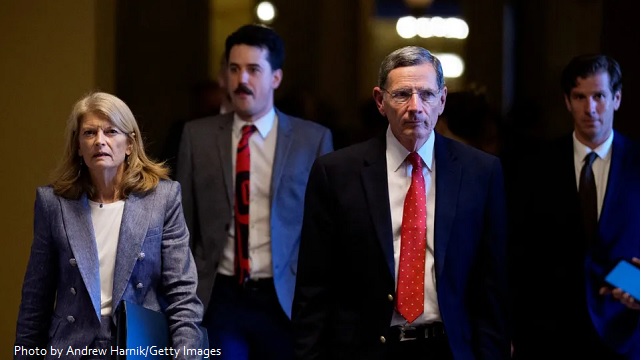The Senate passed President Donald Trump’s “one big, beautiful bill” on Tuesday morning, but only after senators spent hours negotiating changes to the near-1,000 page sweeping budget legislation.
Senate GOP holdouts, such as Sen. Lisa Murkowski of Alaska and Sen. Susan Collins of Maine, were pushing for amendments to Medicaid provisions and clean energy tax credits, and using their leverage to strike deals with Senate Majority Leader Thune throughout the night. Here are some of the last minute changes that were made to the budget reconciliation package.
Medicaid
Collins — who ultimately was one of three Republican senators to vote against the bill — has been a staunch advocate of procuring extra funding for rural hospitals affected by the Medicaid provider tax legislation and initially pushed for a $100 billion rural hospital fund. Senate Republicans instead placed a $25 billion safeguard fund into the bill.
Collins introduced an amendment to raise the fund to $50 billion by raising taxes on billionaires, but the vote failed 22-78 with 18 Republicans and four members of the Senate Democratic Caucus voting in favor. Despite her failed amendment, Collins’ increased rural hospital fund was added into the bill without the need for taxes to be increased.
Green Energy Tax Credits
Senate Republicans made last-minute alterations to green energy provisions, striking a controversial excise tax and giving tax credits to solar and wind projects that begin construction within a year of the bill’s enactment. The amendment still requires projects with later construction dates than summer 2026 to produce electricity by the end of 2027 to qualify for the credits.
Republican Sens. Joni Ernst of Iowa, Chuck Grassley of Iowa, John Curtis of Utah and Murkowski all played key roles in negotiations over the energy amendments.
Other Tax Credits
A new tax credit for contributions to nonprofits granting scholarships to elementary and secondary schools has been added to the budget bill. Taxable contributions include those made to scholarship organizations that provide funds to eligible students within the state of the organization.
Democratic Arizona Sen. Mark Kelly’s bill aiming to change the Internal Revenue Code of 1986 also made it into the reconciliation bill. Kelly’s measure would restore the Real Estate Investment Trust (REIT) subsidiary asset test by increasing the asset percentage threshold from 20% to 25%. It would provide REITs more flexibility in how they format their subsidiary holdings.
The added bill would take effect December 31, 2025.
The Bill’s Title
The legislation’s former name, the “One Big Beautiful Bill Act” is officially no more. Democrats used special Senate budget rules to delete the Trump-given title on Tuesday, much like Republicans revoked the Inflation Reduction Act title in 2022. Democrats also pulled a similar move in 2017, removing the name of the Republicans’ Tax Cuts and Jobs Act.
Artificial Intelligence
In a 99-1 vote, the Senate removed a ten-year moratorium on state and local artificial intelligence (AI) regulation. Republican Tennessee Sen. Marsha Blackburn introduced the amendment to revoke the proposed ban after dropping out of a deal with Republican Texas Sen. Ted Cruz to cut the moratorium from ten years to five.
Blackburn claimed she left the deal with Cruz due to the carveouts allowing states to regulate child sexual abuse content and children’s online safety, claiming the compromise could still “allow Big Tech to continue to exploit kids, creators, and conservatives.”
SNAP
Throughout hours of negotiation, Murkowski also secured changes to the Supplemental Nutrition Assistance Program (SNAP) for Alaska, claiming they will allow for “greater flexibility” for her constituents. Democratic Senators such as Amy Klobuchar of Minnesota took issue with the special Alaska-specific provisions, arguing other states should get SNAP carve outs also.
Even with the changes in the bill, Murkowski has still called on the House to send the bill back to the Senate to continue making alterations to the text.
“Do I like this bill? No. But I tried to take care of Alaska’s interests,” Murkowski told NBC News after the final vote on the bill. “My hope is that the House is gonna look at this and recognize that we’re not there yet.”
AUTHOR
Andi Shae Napier
Congressional Reporter.
RELATED ARTICLES:
Senate Passes Trump’s ‘Beautiful’ Bill After Holdout Supplies Critical Vote
House Hardliners Waste Little Time Throwing Cold Water On Senate Version Of Megabill
EXCLUSIVE: Chip Roy Explains Why He’s A No On Senate-Passed Version Of Trump’s Megabill
Democrats’ ‘Project 2029’ Looks A Whole Lot Like Their 2024
RELATED VIDEO: Alligator Alcatraz Is Upon Us
EDITORS NOTE: This Daily Caller column is republished with permission. ©All rights reserved.
All content created by the Daily Caller News Foundation, an independent and nonpartisan newswire service, is available without charge to any legitimate news publisher that can provide a large audience. All republished articles must include our logo, our reporter’s byline and their DCNF affiliation. For any questions about our guidelines or partnering with us, please contact [email protected].
The post Here’s What The Senate Changed In The ‘Big, Beautiful’ Bill appeared first on Dr. Rich Swier.
Click this link for the original source of this article.
Author: The Daily Caller
This content is courtesy of, and owned and copyrighted by, https://drrichswier.com and its author. This content is made available by use of the public RSS feed offered by the host site and is used for educational purposes only. If you are the author or represent the host site and would like this content removed now and in the future, please contact USSANews.com using the email address in the Contact page found in the website menu.








